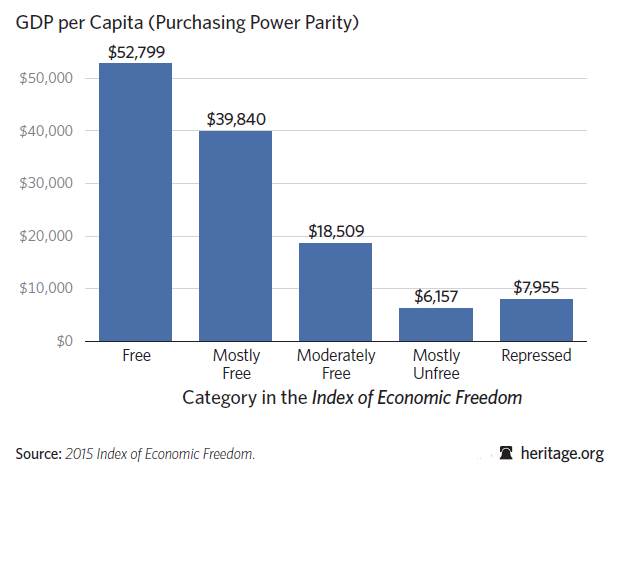After seven years on the decline, Economic Freedom is on the rise in the U.S. once again, according to the Heritage Foundation/Wall Street Journal Economic Freedom Index. The U.S., while still rated as only “mostly free,” improved its score through modest changes in a number of categories, including government spending and “labor freedom” in the 21-year-old index, which was released Tuesday.
“Since 2008, the U.S. has been losing economic freedom because of big government policies, bailouts, the erosion of the rule of law, and crony capitalism,” said Anthony Kim, a senior policy analyst at Heritage and a co-author of the report.
Related: Boehner and McConnell Skewer Obama’s SOTU Plans
“In our 2015 index we found a very encouraging uptick in that trend line,” he said. “The decline of economic freedom has stopped. This is very early stage, but the data suggests that we have an opportunity to reverse and get the policy right.”
The assumptions that underlie the rankings are those of the extremely conservative Heritage Foundation, which does all the analysis and compiles the report. They also reflect the sensibilities of the Wall Street Journal’s conservative editorial page, whose editor, Paul Gigot contributed a foreword.
Those assumptions include the belief, for instance, that levels of government spending, in themselves, are an indicator of how free economic actors are in a country. The index also takes into account, among other, fairly non-controversial things, such as freedom from official corruption, freedom of investment, respect for property rights, and free trade. The sources of data are unimpeachable – including the International Monetary Fund, the World Bank, etc.
With the assumptions noted, the 21-year history of the Index gives its findings some historical heft, and according to Kim, the news this year is good.
Related: Arkansas Republican Gov Gambles on Medicaid Expansion
“Global economic freedom has been increasing despite all the challenges we’ve been facing,” he said. “That improvement has been driven by a lot of developing countries rather than advanced nations. They have been making progress step by step and collectively they have contributed to this increase in economic freedom.”
The countries that rank one through five on the index, Hong Kong, Singapore, New Zealand, Australia, and Switzerland, were no surprise. Hong Kong has resided at the top of the list in every Index ever released. The other four have mostly been trading places among themselves.
Americans will be sorry to learn that not only is the United States not the freest economy on the planet, it isn’t even the freest economy in North America. Canada once again claimed that honor, ranking sixth, compared to the U.S’s showing at 12th.
Judging by Gigot’s foreword, there’s not much chance of the U.S. heading very far up the list until the leadership in the White House changes.
Related: Greeks See Light at the End of the Austerity Tunnel
“[The U.S.’s] precipitous decline in the Index in the wake of the financial panic of 2008 and the rise of the Obama Administration seems to have been arrested,” Gigot wrote.
Playing off the current struggle for Democratic rights in Hong Kong, a place that conservative economist Milton Friedman once called the “modern exemplar of free markets and limited government” but which is increasingly coming under the control of mainland China, Gigot saw a parallel.
“The election of a Republican Congress in November 2014 gives some new hope for a revival, but that will require the rise of a new generation of leaders willing to relearn the old lessons about freedom and prosperity that Milton Friedman taught us through the example of Hong Kong. So here we go, back to the barricades.”
Top Reads from The Fiscal Times


